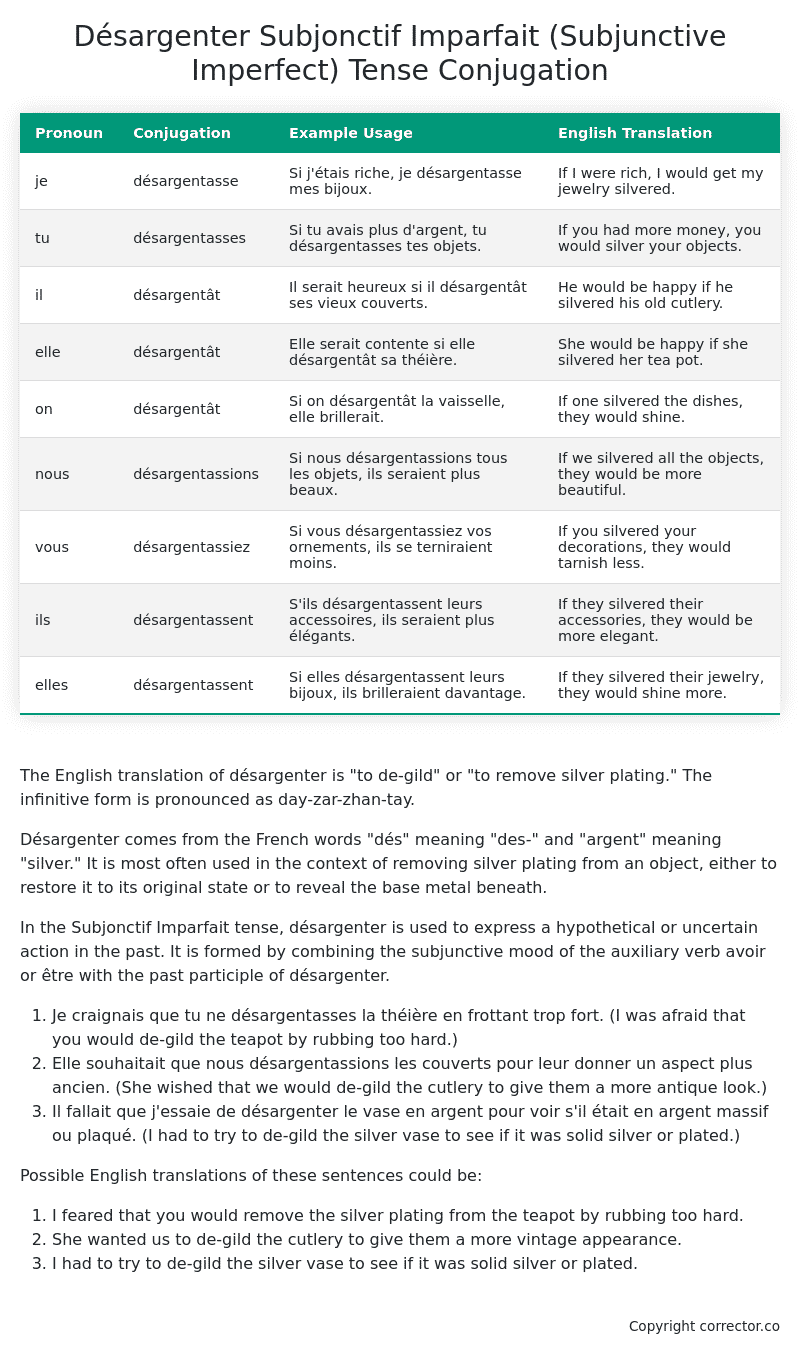Subjonctif Imparfait (Subjunctive Imperfect) Tense Conjugation of the French Verb désargenter
Introduction to the verb désargenter
The English translation of désargenter is “to de-gild” or “to remove silver plating.” The infinitive form is pronounced as day-zar-zhan-tay.
Désargenter comes from the French words “dés” meaning “des-” and “argent” meaning “silver.” It is most often used in the context of removing silver plating from an object, either to restore it to its original state or to reveal the base metal beneath.
In the Subjonctif Imparfait tense, désargenter is used to express a hypothetical or uncertain action in the past. It is formed by combining the subjunctive mood of the auxiliary verb avoir or être with the past participle of désargenter.
- Je craignais que tu ne désargentasses la théière en frottant trop fort. (I was afraid that you would de-gild the teapot by rubbing too hard.)
- Elle souhaitait que nous désargentassions les couverts pour leur donner un aspect plus ancien. (She wished that we would de-gild the cutlery to give them a more antique look.)
- Il fallait que j’essaie de désargenter le vase en argent pour voir s’il était en argent massif ou plaqué. (I had to try to de-gild the silver vase to see if it was solid silver or plated.)
Possible English translations of these sentences could be:
- I feared that you would remove the silver plating from the teapot by rubbing too hard.
- She wanted us to de-gild the cutlery to give them a more vintage appearance.
- I had to try to de-gild the silver vase to see if it was solid silver or plated.
Table of the Subjonctif Imparfait (Subjunctive Imperfect) Tense Conjugation of désargenter
| Pronoun | Conjugation | Example Usage | English Translation |
|---|---|---|---|
| je | désargentasse | Si j’étais riche, je désargentasse mes bijoux. | If I were rich, I would get my jewelry silvered. |
| tu | désargentasses | Si tu avais plus d’argent, tu désargentasses tes objets. | If you had more money, you would silver your objects. |
| il | désargentât | Il serait heureux si il désargentât ses vieux couverts. | He would be happy if he silvered his old cutlery. |
| elle | désargentât | Elle serait contente si elle désargentât sa théière. | She would be happy if she silvered her tea pot. |
| on | désargentât | Si on désargentât la vaisselle, elle brillerait. | If one silvered the dishes, they would shine. |
| nous | désargentassions | Si nous désargentassions tous les objets, ils seraient plus beaux. | If we silvered all the objects, they would be more beautiful. |
| vous | désargentassiez | Si vous désargentassiez vos ornements, ils se terniraient moins. | If you silvered your decorations, they would tarnish less. |
| ils | désargentassent | S’ils désargentassent leurs accessoires, ils seraient plus élégants. | If they silvered their accessories, they would be more elegant. |
| elles | désargentassent | Si elles désargentassent leurs bijoux, ils brilleraient davantage. | If they silvered their jewelry, they would shine more. |
Other Conjugations for Désargenter.
Le Present (Present Tense) Conjugation of the French Verb désargenter
Imparfait (Imperfect) Tense Conjugation of the French Verb désargenter
Passé Simple (Simple Past) Tense Conjugation of the French Verb désargenter
Passé Composé (Present Perfect) Tense Conjugation of the French Verb désargenter
Futur Simple (Simple Future) Tense Conjugation of the French Verb désargenter
Futur Proche (Near Future) Tense Conjugation of the French Verb désargenter
Plus-que-parfait (Pluperfect) Tense Conjugation of the French Verb désargenter
Passé Antérieur (Past Anterior) Tense Conjugation of the French Verb désargenter
Futur Antérieur (Future Anterior) Tense Conjugation of the French Verb désargenter
Subjonctif Présent (Subjunctive Present) Tense Conjugation of the French Verb désargenter
Subjonctif Passé (Subjunctive Past) Tense Conjugation of the French Verb désargenter
Subjonctif Imparfait (Subjunctive Imperfect) Tense Conjugation of the French Verb désargenter (this article)
Conditionnel Présent (Conditional Present) Tense Conjugation of the French Verb désargenter
Conditionnel Passé (Conditional Past) Tense Conjugation of the French Verb désargenter
L’impératif Présent (Imperative Present) Tense Conjugation of the French Verb désargenter
L’infinitif Présent (Infinitive Present) Tense Conjugation of the French Verb désargenter
Struggling with French verbs or the language in general? Why not use our free French Grammar Checker – no registration required!
Get a FREE Download Study Sheet of this Conjugation 🔥
Simply right click the image below, click “save image” and get your free reference for the désargenter Subjonctif Imparfait tense conjugation!

Désargenter – About the French Subjonctif Imparfait (Subjunctive Imperfect) Tense
Formation
Common Everyday Usage Patterns
Interactions with Other Tenses
Subjonctif Présent
Indicatif Passé Composé
Conditional
Conditional Perfect
Summary
I hope you enjoyed this article on the verb désargenter. Still in a learning mood? Check out another TOTALLY random French verb conjugation!


